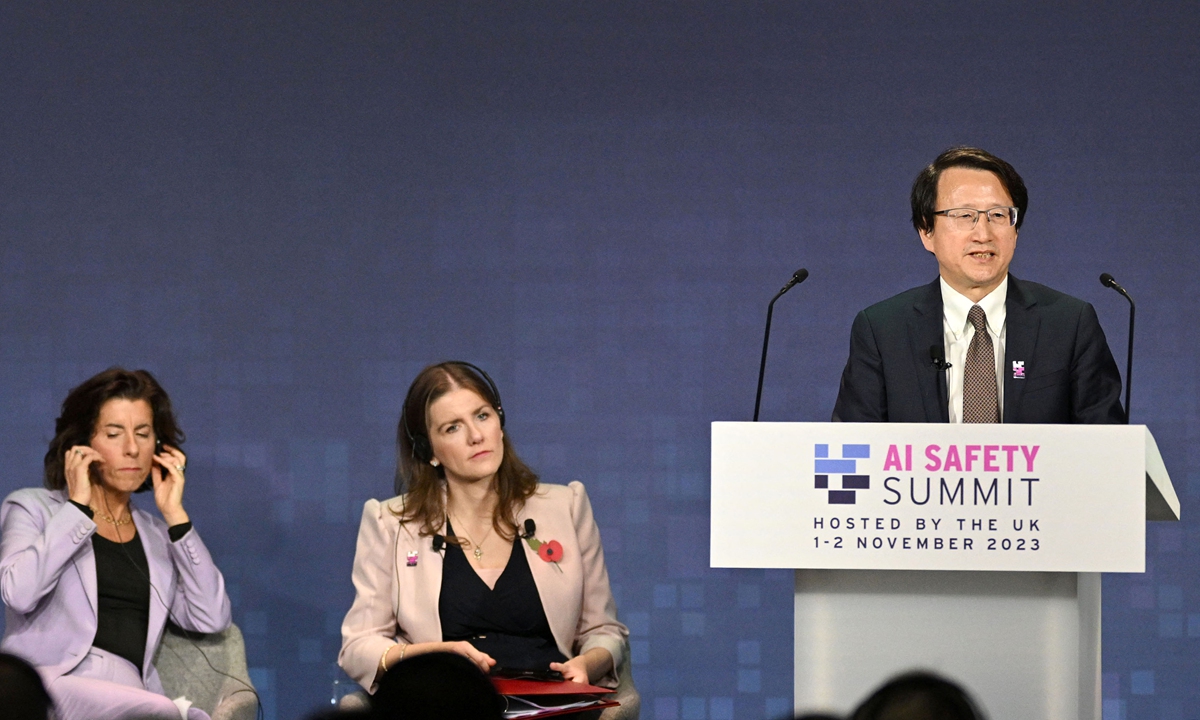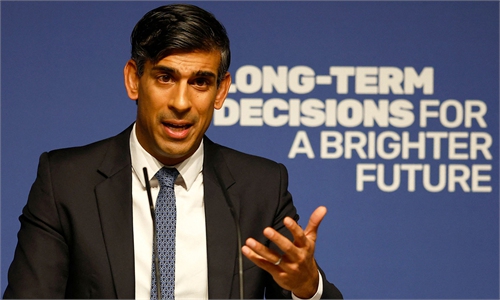
China's Vice Minister of Science and Technology Wu Zhaohui speaks during the UK Artificial Intelligence (AI) Safety Summit at Bletchley Park in central England on November 1, 2023 with US Commerce Secretary Gina Raimondo (left) and the UK's Science, Innovation and Technology Secretary Michelle Donelan listening. Photo: AFP
A delegation led by a senior official from the Ministry of Science and Technology is attending the UK-hosted first Global Artificial Intelligence (AI) Safety Summit from Wednesday to Thursday, where they will introduce the significance of the Global AI Governance Initiative which was launched by China during the Third Belt and Road Forum for International Cooperation (BRF) in October.
Chinese analysts said the summit is not just an event about cutting-edge science and technology issues, but it also has a strong political significance as it will encompass interest allocation and rule-making. Without the participation of China, a leading country in the field of AI which stands on the same starting line as the US, the summit will be incomplete. Experts added that the US needs to cooperate with China rather than contain and slow down China's development in this field.
Wu Zhaohui, vice minister of science and technology, is leading a delegation to the AI Safety Summit that is being held at Bletchley Park in the UK between November 1-2, 2023. At present, AI technology is developing rapidly, and opportunities and challenges coexist, China Central Television (CCTV) reported on Wednesday.
Chinese President Xi Jinping announced at the opening ceremony of the third BRF that China will propose the "Global Artificial Intelligence Governance Initiative." The Initiative systematically elaborates China's plan for AI governance around the three aspects of AI development, security and governance. China will introduce the connotation and significance of the Initiative to all participants during the AI Safety Summit in the UK, according to the CCTV report.
At the same time, as a member of the developing world, China is willing to strengthen exchanges and communication with all parties participating in the meeting on AI safety issues, reflect the common concerns of the Global South about emerging technologies, and pool wisdom to promote the formation of an international mechanism with universal participation and governance framework with broad consensus. It will also stress the need to promote AI technology to better benefit mankind, promote global sustainable development, and jointly build a community with a shared future for mankind.
First AI safety summit
According to Reuters on Wednesday, Britain will convene governments, academia and companies working at the cutting edge of AI on Wednesday at the inaugural AI Safety Summit to debate how, and even if, the risks of the technology can be contained.
The meeting is the brainchild of British Prime Minister Rishi Sunak, who wants to carve out a role for the UK as an intermediary between the economic blocs of the US, China and the European Union, according to the report.
The decision by the Sunak administration to invite China has brought some pressure from some Conservative politicians like former prime minister Liz Truss, Politico reported on October 26, with analysts saying that a few short-sighted and biased UK politicians cannot deny China's advantages in this area, and that real policymakers will understand any meeting about rule-making for cutting edge technology will be invalid and incomplete without China's participation.
Ma Jihua, a veteran expert in the telecom industry, told the Global Times on Wednesday that the summit would not live up to the name of a global summit without China's presence. As China is a leading country in AI development and governance, if it had not been invited, the rules and documents it issues would not be representative. "It is necessary for the UK to invite China to make it a truly global event," Ma said.
Yin Zhiguang, a professor at the School of International Relations and Public Affairs under Fudan University, told the Global Times on Wednesday that due to his education background at the Stanford Graduate School of Business, Sunak has a deep relationship with Silicon Valley elites, so he is a prime minister interested in cutting-edge technology. This is why he wants to burnish his reputation by hosting such a summit and use it to win the next general election.
The US is also seeking to restore communication and even cooperation with China, so at this moment, there will be less opposition from China hawks in the West and its allies for the UK to extend an invitation to Beijing. This will enable the summit to be more inclusive and representative, experts said.
The Financial Times reported on Wednesday that Chinese AI scientists have joined Western academics to call for tighter controls on the technology than those being proposed by the UK, US and EU, "as nations set out rival positions ahead of this week's global AI safety summit." Several Chinese academic attendees have signed on to a statement that warns that advanced AI will pose an "existential risk to humanity" in the coming decades, according to the report.
Ma said the summit is expected to "form a guidance document on regulatory risks and controls." If major players including China, the US and the EU can reach a consensus, it will be of great significance for the future development of AI, Ma said.
Li Haidong, a professor at the China Foreign Affairs University, told the Global Times on Wednesday that "China needs to actively participate in the summit and the process of rule-making for the use of AI, to not only play like a major power with advantages, but also play a role for the Global South in front of the West."
Yin echoed that China needs to join the process to build international norms for AI usage, and that it is very necessary.
Confrontation or cooperation?
As two major powers with a leading position in the field of AI, China and the US need to cooperate with each other and share their advantages to bring greater good for the world, but unfortunately, Washington is trying to use its advantages to contain China and slow China's development, analysts said.
Ma said that the UK's AI safety summit may provide a platform for the Chinese business community to convey the viewpoint of win-win cooperation amid the US' move to suppress China's development in AI chip sector to slow China's progress.
Reuters reported on October 24 that chip designer Nvidia said new US export curbs on the sale of its high-end AI chips to China came into effect on October 23 as "regulators advanced the deadline." The restrictions were supposed to come into play 30 days from October 17 when the Biden administration unveiled measures to stop countries, including China, Iran and Russia, from receiving advanced AI chips designed by Nvidia and others.
Nvidia does not expect a near-term impact on its earnings from the move, it disclosed in a filing on October 24, but did not say why the US government had accelerated the timing, the report said.
"We do believe that we'll have plenty of opportunity in China, continuing to deploy our products there broadly, even as we comply and work with BIS," Intel CEO Pat Gelsinger said on an earnings call, referring to the US Commerce Department's Bureau of Industry and Security, Nikkei Asia reported on October 27.
"Currently, China and the US are on the same starting line in the field of AI. The US is better at technological research and development, and China has more practical applications. China and the US have an equal competitive relationship, and each has its own advantages and can further cooperate and develop," Ma noted.
The summit will help convey the perspective of win-win cooperation, and some voices from the business and industrial circle are expected to have a positive impact on US policy formulation, Ma said.


